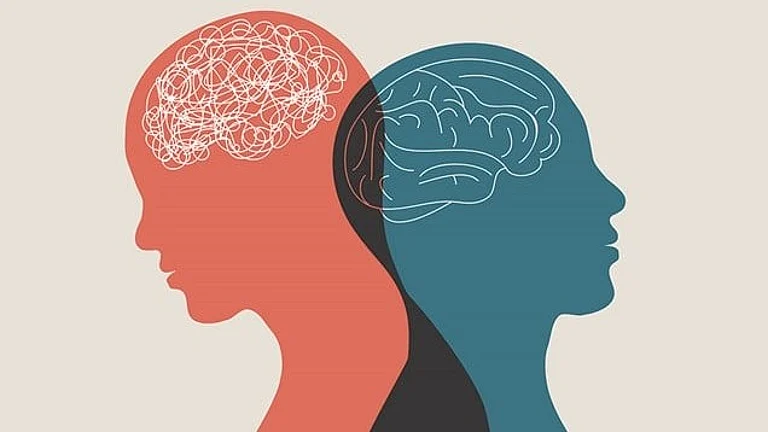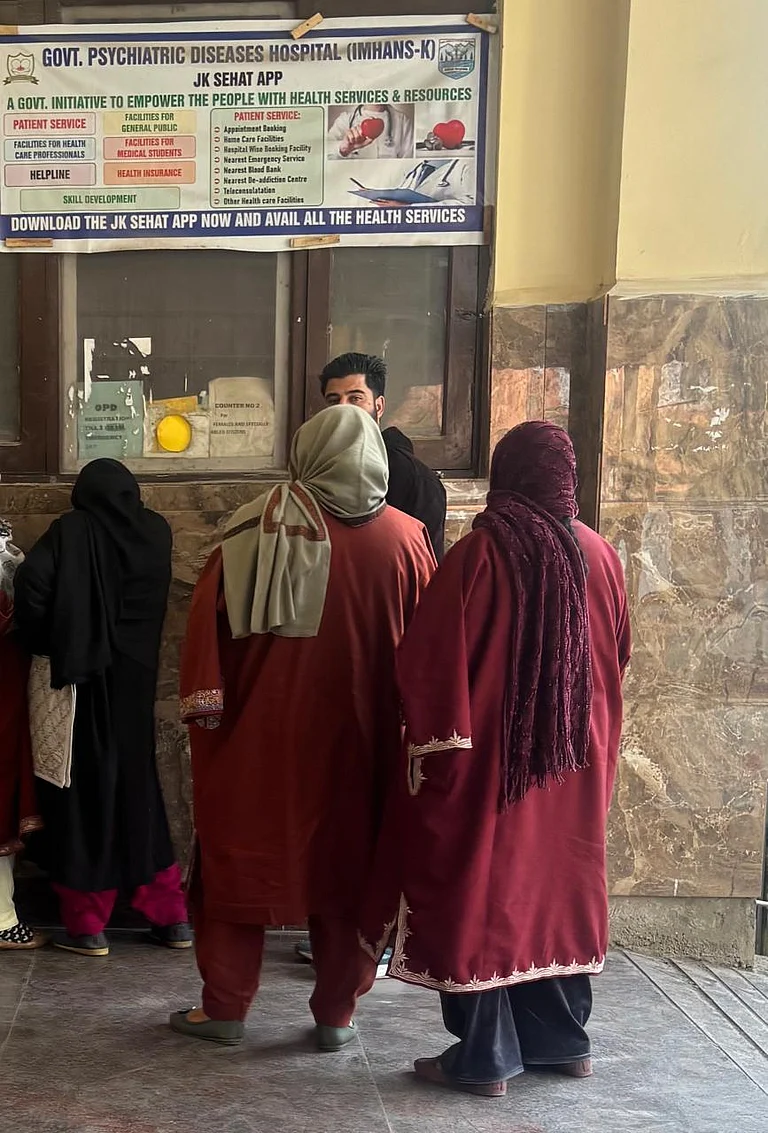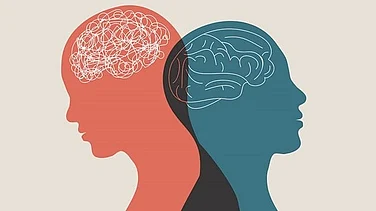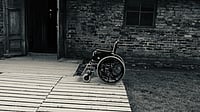My name is Sunil, and I come from village Ayya in Mirzapur, Uttar Pradesh. Before I got married, my brother was living in Allahabad. After my marriage, I started facing depression, but no one knew about mental illness in my village back then, so I didn’t get any treatment. It was very difficult; I had very negative thoughts all the time. I felt like I couldn’t do anything or survive. My mind was never at peace, and I couldn’t sleep well.
One of the biggest problems I had was with obsessive thoughts. For example, I would constantly worry about the gas cylinder exploding at home. I would check it over and over because I was scared something bad might happen. Even now, those thoughts come back sometimes.
That’s why we have an induction cooker at home. Everything my wife cooks is curry-based, we never eat dry vegetables, because we don’t have a gas stove. I once told the doctor that if a gas stove were installed in my house, I wouldn’t be able to sleep, as the thought of an explosion would keep occurring to me. I no longer have Obsessive Compulsive Disorder.
The trouble started for me in my engineering course. I had ranked 481 in the general category in the engineering entrance exam after my board exams, and I also studied at a prestigious institute. But I had depression from my very first year in college. I had zero ability to concentrate. Attending classes was very tough for me. In my school board exams, I did very well, but not in college.
My youngest brother graduated as a chemical engineer from IIT BHU. My other brother began teaching after my father passed away. My mother, who was illiterate, has also passed away.
A year after marriage, in December 1999, I came to Bengaluru to join my first job at a software company but I struggled to work. Tasks that took others 30 minutes took me two hours. That’s how my office realised I was depressed and I couldn’t continue there.
After that, I could only find low-level work. We sold my wife’s jewellery to make ends meet. I even missed my sister’s wedding because, being her only older brother, I was expected to give Rs 2, 4, if not 10 lakh for her celebrations. To avoid the shame of being penniless, we didn’t go. We stopped visiting the village altogether because people would laugh at me there, saying, ‘Pagal ho gaya’—he’s gone mad. Eventually, all my wife’s jewellery was gone, sold in one emergency after another.
I did get treatment at NIMHANS, but when I stopped medication, my depression returned. My wife’s mental illness was also discovered only after marriage. Several relatives helped us in hard times. My wife also has schizophrenia, though she still doesn’t know it.
The worst part of our life was from 2015 to 2022, when we were homeless. My son was 14, just out of Class 9. I worked on marketing PAN cards and Aadhaar cards. We were thrown out of our house and the landlord kept all our belongings. Ashamed to return to our village, we slept at railway stations or at lodges—if we happened to have money.
Everybody takes only one PAN card in a lifetime. So, to find new clients, we moved from Bengaluru to Hyderabad to be among the Marwari community traders who know Hindi, since I belong to Uttar Pradesh and there is a language barrier for me in the south.
In a day, I typically earned Rs 200 or Rs 400, or nothing. Those days, I still had not sought treatment for depression. It was especially hard during COVID-19, when even sleeping at stations was not allowed.
The lockdown made everything worse. There was no income, no stability and no place to stay. During those months, we were on the streets—bus stands, railway stations.
My wife also started feeling unwell around 2014 or 2015. She still doesn’t believe anything is wrong with her health—but she cannot fall asleep unless she has her medicine. She couldn’t sleep, she’d wander off at night. It was terrifying.
Out of desperation, I tweeted to someone asking for help. I didn’t know at the time that she was connected to a mental health organisation. But within five minutes, I got a response. I had thought that there would be a donation... That one tweet changed everything. They reached out and invited me to Chennai. I didn’t know what to expect. We were hesitant, but we came. And if we hadn’t—honestly—I don’t think we’d be alive today.
It is four years ago that we came to The Banyan. They are trying to arrange my son’s engineering fees. I work here now and earn a salary. My wife and I are both on medication and have monthly reviews. Because of our homelessness, my son wasn’t socialised properly and had severe social anxiety. It took him three years to regain his confidence. Now he takes life one day at a time.
We don’t go back to my village anymore. People there still call us “crazy”. There’s stigma. My daughter passed away years ago. She had a heart condition, and we couldn’t afford treatment. We were homeless then. We couldn’t even arrange a proper cremation, but we donated her body to a medical college in Warangal for students to learn from. Seeing so many people helped by organ donation is a comfort. Even though we couldn’t donate her organs, her body helped medical students study.
The government hospitals here in Tamil Nadu are almost free, unlike in Uttar Pradesh, where you may have to pay bribes. I saw firsthand how the system works in other places—doctors often take money unofficially.
I’m 51 now. I’ve lived through poverty, homelessness, grief and a mental health condition that no one around me understood for most of my life. But today, I feel calmer. There’s no more tension about where the next meal will come from. We’re not alone anymore.
I still don’t know what the future holds, but for the first time in a long time, I feel like I have one.
MORE FROM THIS ISSUE
In its August 21 issue, Every Day I Pray For Love, Outlook collaborated with The Banyan India to take a hard look at the community and care provided to those with mental health disorders in India. From the inmates in mental health facilities across India—Ranchi to Lucknow—to the mental health impact of conflict journalism, to the chronic stress caused by the caste system, our reporters and columnists shed light on and questioned the stigma weighing down the vulnerable communities where mental health disorders are prevalent.
This profile is part of a narrative set of lived experiences the residents of The Banyan shared with Outlook’s editor Chinki Sinha. They were published in print as The Bearable Lightness of Being.Outlook collaborated with The Banyan India to take a hard look at the community and care provided to those with mental health disorders in India. From the inmates in mental health facilities across India—Ranchi to Lucknow—to the mental health impact of conflict journalism, to the chronic stress caused by the caste system, our reporters and columnists shed light on and questioned the stigma weighing down the vulnerable communities where mental health disorders are prevalent.
This profile is part of a narrative set of lived experiences the residents of The Banyan shared with Outlook’s editor Chinki Sinha. They were published in print as The Bearable Lightness of Being., Outlook collaborated with The Banyan India to take a hard look at the community and care provided to those with mental health disorders in India. From the inmates in mental health facilities across India—Ranchi to Lucknow—to the mental health impact of conflict journalism, to the chronic stress caused by the caste system, our reporters and columnists shed light on and questioned the stigma weighing down the vulnerable communities where mental health disorders are prevalent.
This copy appeared in print as “What Were We Before We Were We.”




































